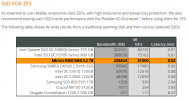Hey Guys,
Hoping you can help out. I would like to setup a very basic proxmox VM Host. I am planning on using the Following:
1) Core i7-4790
2) Z97 Motherboard
3) 1 x NVME drive, 2x Sata hdd, 2x SSD
4) 32GB RAM - DDR3
I am trying to best figure out my disk layout. I am thinking this would be the best usage of my disks
NVME Boot Drive, 500 GB. 1x Disk Pool (Hot), SSDs, 1xDisk Pool (Warm) SATA Drives.
I am familiar with Linux but am really a windows guy so i want to make sure i am at least going in the right direction. I plan on setting up several windows server 2019 VMs, Including Exchange, FIle Servers, etc and maybe a few others as well.
If i allow the ProxMox installer to Use the entire nVME drive does that make sense? or will the drive just sit at 10% usage by the Proxmox install?
Thanks,
Robert
Hoping you can help out. I would like to setup a very basic proxmox VM Host. I am planning on using the Following:
1) Core i7-4790
2) Z97 Motherboard
3) 1 x NVME drive, 2x Sata hdd, 2x SSD
4) 32GB RAM - DDR3
I am trying to best figure out my disk layout. I am thinking this would be the best usage of my disks
NVME Boot Drive, 500 GB. 1x Disk Pool (Hot), SSDs, 1xDisk Pool (Warm) SATA Drives.
I am familiar with Linux but am really a windows guy so i want to make sure i am at least going in the right direction. I plan on setting up several windows server 2019 VMs, Including Exchange, FIle Servers, etc and maybe a few others as well.
If i allow the ProxMox installer to Use the entire nVME drive does that make sense? or will the drive just sit at 10% usage by the Proxmox install?
Thanks,
Robert


